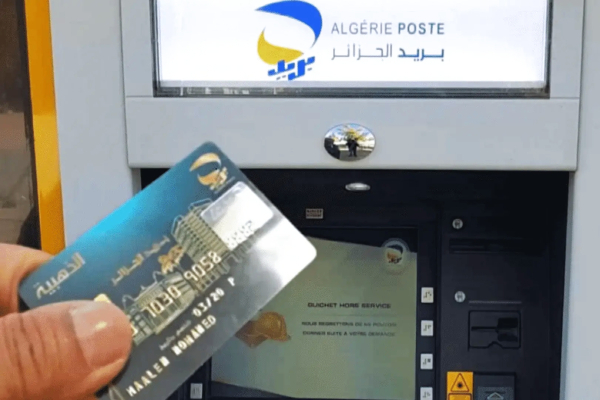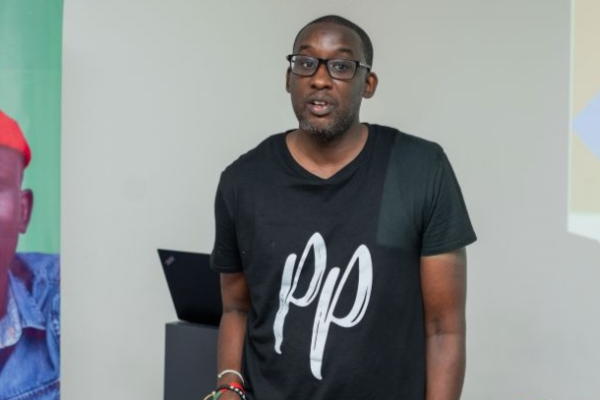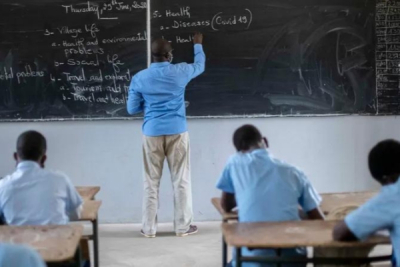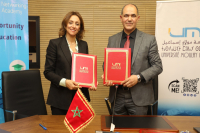On Thursday, May 9, Algerian Minister of Post and Telecommunications, Karim Bibi Triki, announced the upcoming installation of 1,000 new automated teller machines (ATMs) by Algérie Poste across the country. This initiative aims to meet the increasing demand for banking and financial services. It will help facilitate daily life for citizens, especially in areas where access to traditional banks is limited.
With several years of experience gained from Senegalese and European companies, he has ventured into the education sector, using technology to assist schoolchildren.
Senegalese Entrpreneur Mafal Lô Absa is the co-founder of Génimi, a startup that streamlines tutoring to aid students in Francophone Africa. Established in 2022, Génimi is a mobile platform that makes learning an enjoyable experience for children, parents, and tutors alike. Its mission is to nurture each child’s potential by teaching them how to learn and instilling a lifelong passion for learning.
Génimi is designed to support elementary students who are struggling with mathematics and reading by identifying their challenges and connecting them with local coaches to help them excel. Besides facilitating diagnosis, the app provides a program to address children’s learning gaps, guides coaches, and generates engaging exercises that children can tackle independently. To date, the app, in collaboration with three schools, has served 1,488 students and trained 38 coaches.
Mafal Lô Absa also serves as the president of CJD Senegal, the national chapter of an international non-profit organization of young leaders and business executives dedicated to fostering entrepreneurship and enhancing the overall performance of businesses and entrepreneurs.
In 2015, he founded FIREFLY Media Senegal, a platform that enables businesses and brands to better understand and engage their target audiences. In 2019, he co-founded PitchPalabre, a company focused on enhancing the capacities of young entrepreneurs.
Mafal Lô Absa earned a degree in systems, networks, and telecommunications engineering in 2004 from Ingésup, a computer engineering school. He also holds a master’s degree in market finance, which he received in 2007 from the Conservatoire National des Arts et Métiers.
With a diverse professional background, he has worked as a business and IT analyst at SIX Telekurs, a Swiss company providing services in the securities, financial information, and payments sectors. He has also held positions as a business analyst at BNP Paribas and Dexia Asset Management, a European asset management company.
Melchior Koba
To make learning more accessible and engaging, two Senegalese tech entrepreneurs launched a new e-learning platform aimed at students from middle school through senior high school. The platform has already secured partnerships with several Senegalese schools.
20/20 Edtech, an e-learning solution developped by a Senegalese startup, provides users with a wealth of educational content accessible via web and mobile platforms at their fingertips. The startup, headquartered in Dakar, was established in 2020 by Abderrahmane Sow and Ahmadou Ba. Its mission is to build a library of cost-effective educational content for students in Francophone Africa.
The startup explains, “By utilizing the 20sur20 platform, students can learn through hundreds of concise, straightforward, and highly engaging videos that enable them to review at their own pace, practice continuously by answering our quiz questions that ensure comprehension of the material, and improve by pinpointing their knowledge gaps and focusing their learning efforts accordingly.”
The solution includes a mobile app, which is exclusively available on Android and not on the Play Store. Users must navigate to the web platform to download the app and register an account by providing their personal information. Once registered, users can access a range of edtech content, from sixth grade to senior high school. Currently, only the content for sixth grade, ninth grade, and twelfth grade is available on 20/20 Edtech.
In addition to a variety of courses, quizzes are provided to enable users to gauge their proficiency levels. An analytical dashboard offers real-time performance visualization, identifies areas of weakness, and automatically addresses them with the platform’s content. The objective is to generate 1,500 videos and 50,000 quizzes across seven subjects (including mathematics, physics-chemistry, life, and earth sciences, philosophy, etc.) for secondary school classes. The aim of 20/20 Edtech is to simplify studies for students at the various levels mentioned.
Adoni Conrad Quenum
He is a dedicated entrepreneur who devotes his life to creating technological solutions aimed at improving the efficiency of small and medium-sized enterprises in Africa. His commitment to entrepreneurship and his innovative spirit have earned him several awards.
Ivorian tech entrepreneur Alex Degny (photo) is the co-founder and CEO of Tajiri, a startup established in 2023 to transform the restaurant management landscape in Côte d'Ivoire and throughout Africa. The company offers a mobile app, compatible with Android and iOS, that simplifies the lives of restaurateurs by providing a platform to log sales, monitor business data, and even secure financing. Its app streamlines order taking and tracking, and facilitates the monitoring and management of inventory for optimal planning.
In addition, Tajiri provides analytical reports that enable performance assessment and data-driven decision-making. It enhances operational efficiency in restaurants by improving communication between the dining area and the kitchen.
As of April 12, 2024, Alex Degny took on the role of president of #Ci20 (Côte d’Ivoire Innovation 20), a coalition of tech companies, succeeding Steven Bedi.
Prior to launching Tajiri, In 2017, Degny founded Innoving, a startup that offers management software to small and medium-sized enterprises. Then, in January 2018, he established RIZE’S, a French startup specializing in digital services.
Degny is a graduate of the Catholic University of West Africa, where he earned a master’s degree in banking, business, finance, and real estate law in 2008. He also holds a certificate in business administration and management from HEC Paris.
Degny embarked on his professional journey in 2011 at FIAO Côte d'Ivoire (West African Investment Finance), serving as the head of the executive office. In 2014, he transitioned to the role of sales manager at WABCO COTIA, a company that specializes in the production and marketing of compound fertilizers. In 2015, he served as an administrative consultant for the rice company GAN Logis. By 2016, he had become the general manager of Agri Hope, a consortium of several companies specializing in agribusiness.
In recognition of his contributions to the fields of technology and entrepreneurship in Africa, Degny was awarded the innovation prize at season 5 of Orange Fab Côte d'Ivoire in 2019.
Melchior Koba
Burkina Faso, like many other African countries, is currently working on digitizing services for citizens. The executive's goal is to fully digitize administrative procedures by 2025.
Burkina Faso's public administration is poised for a digital overhaul, with the Council of Ministers approving a decree on Wednesday to streamline the deployment of robust information systems and high-quality digital platforms.
This initiative, championed by Digital Transition Minister Aminata Zerbo/Sabane, targets a more efficient and effective public service. The decree aims to reduce processing times, facilitate citizen access to services, and ultimately deliver user-friendly, high-quality platforms.
The new measures address longstanding issues that have hampered past digitization efforts, including inadequate pre-launch testing, platform incompatibility, and poor communication between government departments.
This aligns with the National Strategy for the Modernization of Public Administration (SNMAP) 2021-2025, which envisions a model public administration by 2025, underpinned by republican values and focused on serving citizens.
An evaluation by the Ministry of Digital Transition in February revealed that, as of then, 83.97% of administrative procedures were undergoing digitization. The new decree is expected to tighten management of platform rollouts, ensuring the quality of e-services, user data protection, and ultimately, a more secure and efficient public administration.
Samira Njoya
French telecoms group Orange is active in several sectors in Africa. It has decided to enter the cybersecurity sector in the Democratic Republic of Congo with the assistance of its local subsidiary.
Orange RDC, the Democratic Republic of Congo (DRC) subsidiary of French telecoms giant Orange, and Orange Cyberdefense, the group's dedicated cybersecurity unit, signed a partnership agreement on Thursday to enhance cybersecurity in the central African nation.
Under that agreement, Orange Cyberdefense is rolling out three services: “Microsoc” for securing various computer networks nationwide, “Penetration Testing” for vulnerability detection, and “Cyber Diag” for evaluating an organization’s cyber resilience and suggesting solutions in the event of security breaches.
The partnership comes amidst Africa's rapid digital transformation, where cybersecurity has become a crucial consideration. The International Telecommunication Union's 2020 "Global Cybersecurity Index" ranked the DRC 40th on the continent, surpassing only the Central African Republic but lagging behind South Sudan. SInce then, the DRC has made strides under President Félix Tshisekedi's leadership. Notably, the country ratified the African Union (AU) convention on cybersecurity and personal data protection in April 2023.
Africa’s cyberspace as a whole is vulnerable, according to a June 2023 Kearney report titled "Cybersecurity in Africa: Call to Action." “Africa’s cyber resilience is low, particularly around strategy, governance and operational entities and cross-sector cooperation,” the report finds.
Adoni Conrad Quenum
A computer scientist by training, he believes in the potential of e-commerce in Africa. He develops technological solutions to help e-merchants grow their businesses.
Youssef Akalal (photo), a Moroccan computer scientist and entrepreneur, is the co-founder and CEO of Dropify, a platform that empowers e-merchants to establish online stores and sell their products. Founded in 2022, Dropify offers a seamless and free process for creating virtual shops and sales funnels. The platform's intuitive tools and variety of templates aim to provide an optimal user experience, ultimately assisting merchants in achieving their growth objectives. The created stores are equipped with a comprehensive dashboard to manage their content efficiently.
In addition to his role at Dropify, Akalal is also the co-founder and CEO of COD Partner, a company launched in 2022. COD Partner collaborates with online vendors by providing a complete logistics platform, thereby facilitating their access to multiple international markets.
Akalal's educational background includes a master's degree in Systems Architecture from the National School of Electricity and Mechanics (ENSEM), which he earned in 2010. He also holds a master's degree in Information Science and Technology from the University of Quebec in Outaouais, obtained in 2019.
His professional career began in 2007 at BNP Paribas, where he worked as an IT operations pilot. In 2008, he joined Akka Technologies as a quality assurance team leader and was promoted to technical team leader in 2009. Between 2016 and 2022, he worked for IFS North America, a company specializing in enterprise software. During his tenure, he held the positions of Business Intelligence (BI) Analyst and Data & BI Architect successively.
Melchior Koba
Morocco is firmly committed to digital transformation. Recognizing that human resources are the cornerstone of this endeavor, the country is implementing initiatives to modernize educational programs by integrating digital skills from an early age.
The University of Moulay Ismail signed a partnership agreement with Cisco Network Academy, a global online learning platform offered by American technology giant Cisco Systems, on Wednesday, May 8.
This collaboration, established during a visit by a Cisco Network Academy delegation to Morocco, is designed to equip students and faculty with in-demand digital skills in critical areas like computer networking, artificial intelligence, programmable infrastructure, and cybersecurity.
The initiative aligns perfectly with Morocco's "Pacte Esri 2030," the National Plan for Accelerating the Transformation of the Higher Education, Scientific Research, and Innovation Ecosystem by 2030. This strategic plan emphasizes preparing students with the necessary personal, cross-disciplinary, and digital skills to meet the evolving demands of the job market, reflecting both royal directives and the global digital revolution.
The partnership builds upon a tripartite agreement signed last December between the Moroccan Ministry of Higher Education, the Ministry of Digital Transition and Administrative Reform, and Cisco.
Furthermore, this new collaboration aims to strengthen the training and certification programs offered through the "Centres code 212" hosted by Moroccan universities. Students and teachers will gain free, unlimited access to Cisco's partner training programs, along with support in preparing for industry-recognized certifications.
By prioritizing youth training and upskilling the population in digital capabilities, Morocco seeks to cultivate a robust pool of graduates equipped with specialized knowledge in innovative fields. This initiative aims to accelerate the nation's digital transformation journey and position Morocco as an attractive destination for both domestic and international investors.
Samira Njoya
Present in Burkina Faso, Mali, Niger, Togo, Benin, Côte d'Ivoire, Senegal, and Guinea, this fintech solution is rapidly expanding. The goal is to establish itself as a continental benchmark.
LigdiCash is a fintech solution developed by a Burkinabe start-up. It enables users to access a variety of financial services through its web and mobile platforms. Based in Bobo Dioulasso, the startup was founded by Souleymane Traoré.
"The idea was born from the observation that many entrepreneurs, companies, and e-commerce merchants were struggling to find an online payment method for the websites and apps they had developed for their clients," Souleymane Traoré told Croissance Afrique in 2022.
The solution features a mobile app available on iOS and Android –the Android app has already been downloaded over 100,000 times, according to Play Store statistics. After downloading, users must create an account to access the fintech's services. Individuals can, among other things, have an electronic wallet from which they can conduct transactions such as mobile money transfers to various telecom networks, purchase airtime and internet bundles, or make online payments.
For businesses, the fintech offers tailored services to help them grow. It provides an API for online payments via various methods such as credit cards (Visa, Mastercard, American Express, etc.) or mobile money. The Bulk feature allows for transactions like salary or supplier payments to be made in one go using the aforementioned payment methods.
PayLink enables the creation of a payment link through which the user can receive online payments for online sales or fundraising campaigns. "When a merchant uses PayLinks, they publish their items with a link or button next to them. The client can click on it and make a payment if interested in that particular item, and the merchant will be notified of the purchase," explains the startup.
Adoni Conrad Quenum
He champions agent independence by providing them with resources that free up their time and boost their bottom line. Thousands of agents have already benefited from his approach.
Ahmed Nassef (photo), an Egyptian entrepreneur, co-founded and currently serves as the CEO of LeadsMart. This startup, which targets real estate sales employees, brokerage firms, and developers, facilitates advertising campaigns on social platforms.
Established in 2019, LeadsMart is on a mission to transform the real estate sector through AI-assisted lead generation. The platform empowers real estate professionals to swiftly launch advertising campaigns on social networks, thereby streamlining lead generation. With a diverse range of visuals and content customized for each project, users can execute effective campaigns.
LeadsMart distinguishes itself by offering clients real-time campaign statistics, allowing them to monitor costs and modify strategies as needed. Furthermore, the startup provides users with access to a network of real estate professionals, investors, and industry leaders. Since its inception, LeadsMart has developed over 600 projects, generated more than 20,000 leads, and supported over 1,300 sales agents.
In addition to his role at LeadsMart, Nassef is a mentor at the Founder Institute accelerator in Egypt and a partner at Joud Investment, a group of experts specializing in delivering integrated commercial real estate services to investors, buyers, and tenants.
In 2013, Nassef co-founded Fabrica Creative Studio, a startup that offers comprehensive and professional marketing services to industries aiming to attract specific clients and generate more leads. He served as its CTO from 2013 to 2019.
Nassef earned a degree in business administration from Ain Shams University in 2013. Prior to embarking on his entrepreneurial journey, he worked as a system engineer at Unilever Foodsolutions from 2009 to 2010.
Melchior Koba
More...
He has over 12 years of experience in software development. He has created and developed several technological solutions aimed at supporting the workforce in Africa.
Steve Ndende (photo), a Congolese entrepreneur and computer scientist, is the founder and CEO of Agri Zoom, a platform launched to provide farmers with access to loans and a marketplace for selling their products.
Launched in 2018, Agri Zoom offers a crowdfunding system for farmers, fishers, and processors of agricultural products. Its online marketplace simplifies the sale of crops, allowing farmers to concentrate on production.
In addition to Agri Zoom, Ndende is the founder and CEO of MboteShop, an e-commerce platform that operates in the Republic of Congo, the Democratic Republic of Congo, Gabon, and Cameroon. Launched in 2021, MboteShop is one of Ndende’s many entrepreneurial ventures.
Ndende is also the founder and a web developer at Essengo Solutions, a digital communication and software development agency. Established in 2023, Essengo Solutions supports companies and individuals in their digital transformation.
The entrepreneur has a robust professional background. He earned a degree in software engineering from Ecole africaine de développement in Brazzaville in 2015 and a professional diploma in entrepreneurial studies from the University of Iowa in 2019. Before founding his own companies, he served as the technical director at Eyano until 2022 and co-founded Ndende Lab in 2017, where he worked as a developer until 2022.
In addition to his entrepreneurial activities, Ndende was an active contributor to the Fongwama open-source development community from 2015 to 2018. He also served as a trainer and speaker at JCertif International, a non-profit organization that organizes training and events in IT and communication technology, from 2015 to 2022.
Ndende’s commitment and professional achievements have been recognized on multiple occasions. In 2018, he won first prize in the FAO’s global challenge “My Food My Future.” In 2019, his start-up Agri Zoom was selected as one of the Top 1000 Entrepreneurs by the Tony Elumelu Foundation.
Melchior Koba
At the 2nd Digital Entrepreneurship and Artificial Intelligence Fair in May 2023, the Benin government unveiled its project for an AI-based conversational.
Benin is embarking on a project to develop artificial intelligence (AI) systems that prioritize local languages. This collaborative effort brings together the Information and Digital Systems Agency (ASIN),the Ministry of Digital Affairs and Digitalization, Sèmè City, and iSHEERO, a group specializing in data science and AI expertise.
The data collection phase for local languages was launched on Wednesday, May 8th and the gathered information will be used to train large language models (LLMs) powered by AI.
This national initiative aligns with Benin's National Strategy for Artificial Intelligence and Big Data, adopted in January 2023. The strategy aims to harness the potential of AI in various sectors, including education, healthcare, agriculture, and tourism. Additionally, it seeks to position Benin as a leader in AI development within West Africa.
A March 2024 report, "AI and the Future of Government: Unexpected Effects and Critical Challenges", published by the Moroccan think tank Policy Paper, highlights the challenges faced by countries with limited language data when implementing AI models. Benin falls into this category, and this participatory campaign aims to address the potential digital divide arising from AI applications.
"The efficacy of these AI technologies hinges on the availability and quality of data, requiring datasets (corpus) that are not only extensive but also diverse and representative, to ensure their applicability across a wide spectrum of languages and contexts," the report emphasizes.
Adoni Conrad Quenum
Digital solutions tailored for MSMEs can empower businesses across Africa to leverage online platforms, expand their market reach, and drive economic growth by creating job opportunities and fostering entrepreneurship.
Tappi has partnered with the Kenya National Chamber of Commerce and Industry (KNCCI) to launch the Sukuma Biz initiative.
The initiative, announced on May 2, is set to provide tailored digital services to KNCCI’s 30,000 business members to enhance their online credibility and identity. This digital commerce solution for Micro, Small, and Medium Enterprises (MSMEs) enables business owners to easily customize their online presence through a user-friendly app, seamlessly integrating with Google Ads, Facebook Ads, and Instagram Ads using airtime credit or mobile money.
“KNCCI is one of Kenya’s most trusted industry bodies and with its extensive network of local businesses, they’re an ideal partner to accelerate our mission of empowering MSMEs to effectively establish strong reputations of their own in an online setting,” said Griffith.
For a monthly fee of KES500 (US$4), KNCCI members gain exclusive benefits, including a personalized business landing page on tappi’s platform adorned with the KNCCI logo. Members also receive 50 customer reviews via SMS, WhatsApp, or other channels, seamlessly integrated into their landing page, and can send 250 text marketing messages directly to their customers.
Using tappi’s SaaS solutions, KNCCI members can swiftly generate SEO-optimized websites within minutes, guided by an intuitive chat tool. Leveraging AI, machine learning, and algorithms, each website's content and design will be tailored to its target audience and industry sector. Members can also distribute Google, Facebook, and Instagram ads effortlessly and access a range of supplementary digital services.
With Kenya positioned as the 74th largest market for eCommerce, boasting a predicted revenue of US$801.4 million by 2024, according to the ECDB (European Company Database), initiatives like Sukuma Biz are well-placed to capitalize on this growing market. This statistic underscores the potential for tappi's tailored digital services to empower MSMEs in Kenya and contribute to the country's economic development and digital growth.
Hikmatu Bilali
The Gambia has made significant progress in its digital transformation journey. To advance even further, the country is receiving support from the organizations it belongs to, such as ECOWAS.
The President of the Economic Community of West African States (ECOWAS) Commission, Omar Alieu Touray, and the Gambian Minister of Digital Economy, Ousman A. Bah, signed a grant agreement on Friday, May 3, during the 15th Summit of the Organization of Islamic Cooperation (OIC).
This $180,000 grant aims to strengthen The Gambia's digital infrastructure and enhance the country's governance through new technologies.
This initiative is part of an ECOWAS strategy to strengthen the digital capabilities of all its member states. It comes at a time when The Gambia is intensifying its efforts to accelerate digital transformation and improve telecommunications infrastructure to provide its population with innovative new services.
Currently, the country is working on a comprehensive digital strategy set to launch in the coming months. Additionally, The Gambia is preparing to connect to a second international fiber optic submarine cable, funded by the World Bank at a cost of $30 to $35 million. The government is also considering enhancing national connectivity via satellites.
The ECOWAS grant is expected to support the implementation of this strategy, which includes digitizing administrative services, improving citizens' digital skills, and creating a standardized digital identification system, among other initiatives.
Samira Njoya















